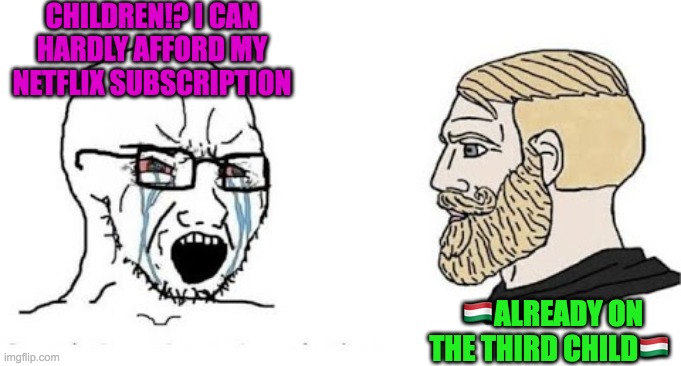The Only European Country Who Appreciate Their Own
The entire developed world is in a state of crisis with respect to low birth rates. I implore you to find a developed, wealthy, functional country that is replacing their population at the requisite fertility rate (2.1). In fact, one benefit our subscribers get is a seven-part series post on how to properly play this as an investor. However, a country in Central Europe, who have been very tough on migration & serious about protecting their country’s values are coming up with their own solution.
Viktor Orban of Hungary just reiterated that every woman who has 4 kids will have no personal income tax for life. The news is that these benefits extend to other areas Hungary is incentivizing their own citizens to grow their population. Meanwhile, everbody else is incentivizing millions of illegal migrants to come from other nations
Check out our article on Hungary
Five years ago Orban stated the following, “In all of Europe there are fewer and fewer children, and the answer of the west to this is migration…They want as many migrants to enter as there are missing kids, so that the numbers will add up. We Hungarians have a different way of thinking. Instead of just numbers, we want Hungarian children. Migration for us is surrender”
Have you seen all of our content? We have over 120 articles in just some short months–stay up to date on all of them by getting a free newsletter!
Join the list for more updates like this one!
Hungary are incentivizing women to have children to get life-long tax breaks. This program has been around for a number of years but new incentives have come on air recently.
Did you read our article on Hungary? We saw them catching illegal migrations live! We have a photo of those camping out in Serbia, looking to enter the EU too. Hungary has been so effective at stopping the migrants they decided to go through Croatia instead!
Here’s the Offers
1) A lifetime personal income tax for women who give birth and raise at least 4 children & a subsidy of $8,825 towards the purchase of a seven-seat vehicle with 3 or more children.
2) A low interest loan of up to $35,000 can be acquired for women under the age of 40 who are marrying for the first time and have one child. A third of the debt will be forgiven after a second child and a complete waived loan after the third child is born.
3) A loan programme for families with at least two children will be broadened to assist in purchasing housing.
4) The tax exemption extends to:
income from self-employment, entrepreneurial dividend base;
income from primary agricultural production;
income from appointed auditing activity;
income from European Parliamentary representation, or as a councillor in a local municipality;
income earned under a contract for work, where the contract was not
concluded by the individual as a self-employed entrepreneur.
Update:
Hungary announces that mothers with one child will be exempt from paying income tax until turning 30 Mothers with 2 or more children will be completely exempt from paying income tax for life.
Normal Family Allowance Per Month:
- HUF 66,670 if there is one dependent child
- HUF 133,330 if there are two dependent children, or
- HUF 220,000 if there are three or more dependent children, per month for each child.
Specific cases
Personal income tax allowance for women under the age of 30 giving birth for the first time:
- Mothers under age 30, as of 1 January 2023, young women giving birth, older than age 25 but not older than age 30 when reaching the 91st day of pregnancy, giving birth, or adopting a child, may reduce their consolidated tax base with this allowance. The maximum amount of the tax relief is HUF 83,865/month in 2024.
Personal income tax allowance for women under the age of 25 giving birth:
- Individuals under age 25 can apply this allowance with respect to certain incomes, but only up to maximum the gross national average income published by the Hungarian Central Statistical Office for the July of the preceding year (HUF 559,100 for July 2023). It practically means that individuals under age 25 can apply the PIT-free allowance but only up to this maximum limit, which is net of HUF 83,865/month in 2024.
We work hard to come up with the latest information to inform you & your families on geopolitics, investing, immigration & trends for your international portfolio. Consider subscribing for a small monthly fee & if that’s not possible right now, please follow us on Twitter & consider sharing this post!
Eligibility
Families are eligible for family allowance from the birth of the child as long as the child lives in the same household and attends school (up till age 20). It is mandatory for children to attend school up to age 16, therefore the earliest when they can leave school is this age. Please note that special regulations apply to children with disabilities.
Eligible persons include
- the parents (either by birth or adoption), foster parents, or guardians of children;
- the spouse or the partner (with registered relationship for more than a year) of the above;
- the managers of certain childcare and social care homes;
- the children themselves, in certain cases, etc.
These can be those who are either Hungarian citizens, immigrants in Hungary, have obtained permanent residency, or are recognized as refugees in Hungary. Any residency that allows you to reside in Hungary for the long-term should qualify.
Non-Hungarian parents must also meet the below requirements:
- EEA citizens (EU, Iceland, Lichtenstein, Norway, Switzerland) need to have a registered address in Hungary;
- non-EEA citizens need to have a single permit (“összevont engedély”): work-permit for at least 6 months, or a work-permit valid for the purpose of intra-corporate transfer for at least 9 months;
- entitled children must be living in the same household in Hungary as the parent;
- entitled children must be either under the age of 3, or, if they are between the age of 3 and 16, they must attend kindergarten or school in Hungary.
- parents can receive family allowance in only one EU country at the same time. That is, if they are eligible both in Hungary and in another country, they must decide and declare where they want to apply for it and let the authorities know
Closing
Demographic decline is a problem in many societies in Central and Eastern Europe. Millions of people leave countries such as Hungary, Poland, Romania and Bulgaria in the years after their accession to the EU for higher salaries in Western Europe. This, combined with low birth rates, has contributed to shrinking populations and fuelled fears of dying communities across the region–and are now putting strain on the domestic economy.
Back in 2019 when this programme has first launched it received criticism that the tax savings of zero income tax were negligible given that Hungary’s personal income tax is capped at 15% and the cost of raising children is so large. Despite this, if you’re planning on having a family anyway it’s an interesting incentive–especially if you do make some big income.
Additionally, the main takeaways here are that the programme benefits available are quite extensive for lots of people Hungary. With some exceptions, it is one of the only countries ‘sticking to their guns’ and focussed on their own culture, values, religion and policy. They are acknowledging the gravity of the problem and are offering some nice incentives for those looking to better themselves & raise a healthy, happy family. The same cannot be said about all the other countries in the Bloc.
Boy, how times can change!
Thank you for reading and please do consider sharing, following & subscribing for lots and lots more!
#StayOnTheBall


